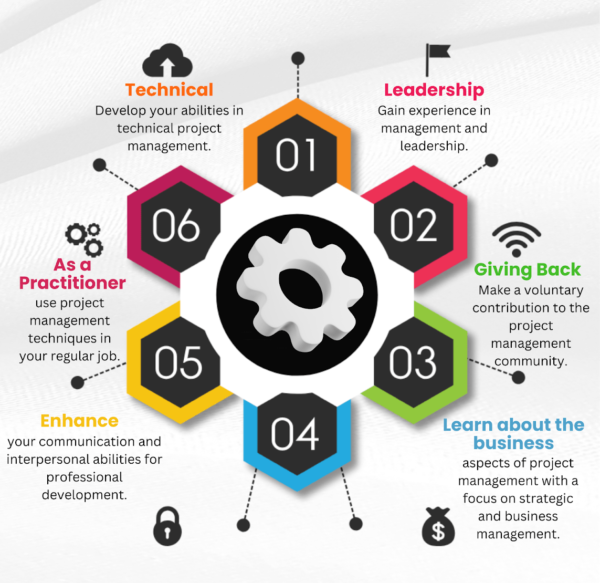What Is PDUS For PMP
What is a PDUs in Project Management

PDUs in Project Management
Contents
What is a PDUs in Project Management
A Professional Development Unit (PDU) is a measure of professional development activity required by the Project Management Institute (PMI) to maintain certifications such as the Project Management Professional (PMP). PDUs are used to quantify approved learning and professional service activities. One PDU typically represents one hour of professional development. The purpose of PDUs is to ensure that certified project managers continue to learn and grow their skills, staying current with industry standards and practices throughout their careers.
How to Earn PDUs
- Education PDUs:
- Courses and Training: Formal training sessions, either online or in-person, provided by PMI or PMI Registered Education Providers (REPs).
- Online or Digital Media: Webinars, podcasts, and e-learning modules that focus on project management skills and knowledge.
- Readings: Books, articles, white papers, and other literature related to project management.
- Informal Learning: Participating in informal learning sessions such as discussions, lunch and learns, or study groups.
- Giving Back PDUs:
- Work as a Practitioner: Applying project management skills in your job, which contributes to your professional experience.
- Creating Content: Writing articles, blogs, or books on project management topics.
- Volunteer Service: Contributing your time and skills to PMI chapters or other project management organizations.
Mentoring: Guiding less experienced project managers and helping them develop their skills.
Understanding PDUs
PDUs are essential for maintaining PMI certifications. They serve as a testament to a project manager’s commitment to professional development and continuous learning. To renew a PMP certification, for example, a project manager needs to earn 60 PDUs over a three-year cycle. This requirement ensures that certified professionals stay current with the latest trends, methodologies, and best practices in project management.
PMI PDU Types
Education PDUs
Education PDUs are earned through structured learning activities. These activities are designed to enhance a project manager’s knowledge and skills. Education PDUs are divided into three subcategories:
- Technical Project Management: This subcategory focuses on the technical aspects of managing projects. Activities include learning about project methodologies, tools, and techniques. Examples include courses on agile project management, risk management, or project scheduling.
- Leadership: Leadership PDUs are earned by developing leadership skills that help in managing teams and influencing stakeholders. Activities might include leadership training programs, workshops on communication skills, or seminars on team dynamics.
- Strategic and Business Management: This subcategory includes activities that align project management with organizational strategy. Examples include courses on business strategy, financial management, or portfolio management.
Giving Back PDUs
Giving Back PDUs recognize the value of contributing to the project management community. These PDUs can be earned through activities that help others in the profession, such as:
- Work as a Practitioner: Utilizing project management skills in your day-to-day job. This ensures practical application of knowledge and continuous learning through experience.
- Creating Content: Developing new content such as articles, blogs, white papers, or presentations that share knowledge with the project management community.
- Volunteer Service: Volunteering with PMI chapters or other organizations that promote project management. This could include serving on boards, committees, or helping organize events.
Mentoring: Providing guidance and support to other project managers, helping them grow their skills and advance in their careers.
Categories of PDUs
PMI has established several categories of PDUs to cover a broad range of professional development activities. These categories ensure that project managers have diverse opportunities to earn PDUs and continue their professional growth. The main categories include:
- Education:
- Courses and Training: Structured learning provided by PMI or REPs. These can be in-person or online.
- Online or Digital Media: Webinars, podcasts, and e-learning modules that focus on project management topics.
- Readings: Books, articles, and other literature related to project management.
- Informal Learning: Participating in informal learning sessions like discussions, study groups, or lunch and learns.
- Work as a Practitioner: Applying project management skills in your professional role. This category recognizes the practical experience gained through daily work.
- Creating Content: Writing articles, blogs, white papers, or books that contribute to the knowledge base of the project management community.
- Volunteer Service: Contributing time and skills to PMI chapters or other project management organizations. This includes serving on boards, committees, or helping organize events.
- Mentoring: Guiding less experienced project managers and helping them develop their skills. This category recognizes the value of sharing knowledge and experience with others.
Education PDUs
Education PDUs are the primary way to earn PDUs. They ensure that project managers keep up-to-date with the latest knowledge and skills in the field. Education PDUs can be earned through various activities:
Courses and Training
Formal courses and training sessions provided by PMI or REPs are a significant source of Education PDUs. These sessions can be in-person or online and cover a wide range of project management topics.
- Project Management Methodologies: Courses on agile, waterfall, and hybrid methodologies.
- Risk Management: Training on identifying, analyzing, and mitigating project risks.
- Project Scheduling: Courses on creating and managing project schedules using tools like Microsoft Project or Primavera.
Online or Digital Media
Online and digital media provide flexible and accessible ways to earn PDUs. These include:
- Webinars: Online seminars on various project management topics.
- Podcasts: Audio programs that discuss project management trends, challenges, and best practices.
- E-learning Modules: Self-paced online courses on specific project management skills.
Readings
Reading books, articles, white papers, and other literature related to project management is another way to earn Education PDUs. PMI recognizes the value of staying informed about industry trends and new developments. Examples include:
- Books: Reading project management books by renowned authors.
- Articles: Reading articles from reputable project management journals or websites.
- White Papers: Reading research papers and case studies on project management topics.
Informal Learning
Participating in informal learning sessions is another way to earn Education PDUs. These sessions provide opportunities for discussion and knowledge sharing among peers. Examples include:
- Lunch and Learns: Informal sessions where project management topics are discussed over lunch.
- Study Groups: Collaborative learning groups that discuss project management concepts and prepare for certification exams.
Discussions: Engaging in discussions with colleagues or mentors about project management topics.
Strategies for Earning High PMP PDUs
Earning PDUs can be a manageable and rewarding process if approached strategically. Here are some strategies to help you earn high PMP PDUs:
- Plan Ahead: Schedule your PDU activities throughout the three-year cycle. This helps avoid a last-minute rush and ensures you meet the requirements on time.
- Diversify Your Activities: Engage in various PDU-earning activities to meet the requirements in different categories. This approach keeps your learning diverse and comprehensive.
- Utilize Free Resources: Many free webinars, podcasts, and articles are available online. Take advantage of these resources to earn PDUs without incurring additional costs.
- Track Your PDUs: Use PMI’s online tools to track and manage your PDUs. Regularly updating your PDU record helps you stay on top of your certification requirements.
- Volunteer: Get involved with your local PMI chapter or other professional organizations. Volunteering not only helps you earn PDUs but also expands your professional network.
PMI PDU for Mentoring
Mentoring is a valuable way to earn Giving Back PDUs. As a mentor, you provide guidance and share your expertise with less experienced project managers. This not only helps them grow but also contributes to your professional development. PMI recognizes the time spent mentoring as a significant contribution to the profession.
Mentoring can take various forms, such as:
- Formal Mentoring Programs: Participating in structured mentoring programs offered by PMI chapters or other organizations.
- Informal Mentoring: Providing ad-hoc guidance and support to colleagues or peers.
- Coaching: Offering one-on-one coaching sessions to help individuals develop specific project management skills.
Mentoring helps build a strong project management community by fostering knowledge transfer and professional growth. It also enhances your leadership and communication skills, making it a mutually beneficial activity.
PMI PDU Coupon Code
Occasionally, PMI or its partners may offer coupon codes for discounts on PDU-earning courses and activities. These codes can provide savings on webinars, courses, or conferences. Keep an eye on PMI communications and partner websites for promotional offers.
Here are some tips to find and use PMI PDU coupon codes:
- Subscribe to PMI Newsletters: PMI often shares promotional offers and discounts through their newsletters.
- Follow PMI on Social Media: PMI and its partners frequently post discount codes and promotional offers on their social media channels.
- Check Partner Websites: PMI Registered Education Providers (REPs) and other partners may offer coupon codes for their courses and training programs.
- Attend PMI Events: PMI events, such as conferences and chapter meetings, sometimes offer special discounts on PDU-earning activities.
Using coupon codes can significantly reduce the cost of earning PDUs, making it more affordable to maintain your certification.
How to Earn and Calculate PDUs?
Earning and calculating PDUs involves participating in qualifying activities and logging them with PMI.
- Identify Eligible Activities: Check the PMI guidelines to ensure your activities qualify for PDUs. PMI provides detailed information on eligible activities and their respective PDU values.
- Track Your Time: Keep a record of the time spent on each activity. One hour of participation typically equals one PDU.
- Log Your PDUs: Use PMI’s online Continuing Certification Requirements System (CCRS) to log your activities. Enter the details of each activity, including date, duration, and category.
- Review Your PDU Report: Ensure all PDUs are categorized correctly and meet the requirements for your certification renewal.
Here’s a detailed example of how to earn and calculate PDUs:
Step 1: Identify Eligible Activities
- Webinar Attendance: You attended a 2-hour webinar on agile project management.
- Reading: You read a 300-page book on risk management (estimated 8 hours).
- Volunteering: You volunteered for 5 hours at a local PMI chapter event.
Step 2: Track Your Time
- Webinar: 2 PDUs (1 hour = 1 PDU)
- Reading: 8 PDUs (1 hour = 1 PDU)
- Volunteering: 5 PDUs (1 hour = 1 PDU)
Step 3: Log Your PDUs
Log into the CCRS and enter the details for each activity:
- Webinar: Enter the webinar title, date, duration (2 hours), and category (Education – Technical Project Management).
- Reading: Enter the book title, author, date, duration (8 hours), and category (Education – Technical Project Management).
- Volunteering: Enter the event details, date, duration (5 hours), and category (Giving Back – Volunteer Service).
Step 4: Review Your PDU Report
Check your PDU report to ensure all entries are accurate and categorized correctly. Make any necessary adjustments to meet the certification renewal requirements.
What Are PDU PMI Requirements, Why PMI PDUs?
PMI requires certified professionals to earn PDUs to maintain their certifications. The primary reasons for this requirement include:
- Maintain Competence: PDUs ensure that project managers stay up-to-date with current practices, methodologies, and industry trends.
- Promote Lifelong Learning: PDUs encourage continuous professional development, helping project managers grow their skills and knowledge.
- Ensure Quality: PDUs uphold the standards and quality of PMI certifications, ensuring that certified professionals are competent and capable.
To renew a PMP certification, for example, you need to earn 60 PDUs over a three-year cycle. These PDUs must be distributed across different categories to ensure a well-rounded professional development. The specific requirements for other PMI certifications may vary, but the underlying principle of continuous learning remains the same.
Tips for Maximizing PDU Earning Potential
Maximizing your PDU earning potential requires a proactive and strategic approach. Here are some tips to help you make the most of your PDU opportunities:
- Leverage Employer Programs: Many employers offer training programs, workshops, and seminars that count as PDUs. Check with your HR or training department to see what opportunities are available.
- Join PMI: PMI members often have access to free or discounted PDU opportunities, such as webinars, articles, and chapter events. Membership also provides access to a network of professionals who can share information about PDU opportunities.
- Network: Connect with other project managers through PMI chapters, professional associations, and online communities. Networking can help you learn about new PDU opportunities and stay informed about industry trends.
- Stay Informed: Regularly check PMI’s website and newsletters for updates on PDU opportunities, new courses, and changes to certification requirements.
- Use Free Resources: Take advantage of free webinars, podcasts, and articles available online. Many organizations and professionals offer valuable content that can help you earn PDUs without additional costs.
- Volunteer: Volunteering with PMI chapters or other professional organizations not only helps you earn PDUs but also enhances your leadership skills and expands your professional network.
- Plan Your PDU Activities: Schedule your PDU activities throughout the three-year cycle. This approach helps you avoid a last-minute rush and ensures you meet the requirements on time.
- Track Your PDUs Regularly: Use PMI’s online tools to track and manage your PDUs. Regularly updating your PDU record helps you stay on top of your certification requirements and identify any gaps.
The Importance of PDUs: What Happens If You Fail to Earn Them?
PDUs are crucial for maintaining PMI certifications. They demonstrate your commitment to continuous learning and professional growth. Failing to earn the required PDUs can have significant consequences:
- Suspension of Certification: If you don’t meet the PDU requirements by the end of your certification cycle, your certification will be suspended. During this suspension period, you cannot refer to yourself as a PMI-certified professional.
- Grace Period: PMI typically offers a one-year grace period to earn the remaining PDUs and submit your renewal application. If you meet the requirements within this period, your certification will be reinstated.
- Expiration of Certification: If you fail to earn the required PDUs and renew your certification within the grace period, your certification will expire. To regain your certification, you would need to reapply, meet the eligibility requirements, and retake the exam.
Maintaining your certification is essential for career growth and professional credibility. Earning PDUs helps you stay updated with industry trends, enhances your skills, and demonstrates your commitment to the profession.
How Can You Retain Your PMP Credential?
To retain your PMP credential, you need to meet the following requirements:
- Earn 60 PDUs: You must earn 60 PDUs within each three-year certification cycle. These PDUs should be distributed across different categories to ensure a well-rounded professional development.
- Log PDUs Promptly: Use PMI’s online Continuing Certification Requirements System (CCRS) to log your PDUs regularly. Enter the details of each activity, including date, duration, and category.
- Pay Renewal Fees: Submit the renewal application and pay the required renewal fee. PMI members typically pay lower renewal fees than non-members.
- Stay Active in the Profession: Engage in project management activities, continue learning, and contribute to the profession. This not only helps you earn PDUs but also keeps you updated with the latest trends and best practices.
By meeting these requirements, you can retain your PMP credential and continue to benefit from the career opportunities and professional credibility it provides.
What are PDU Credits?
PDU credits are the units used to quantify the time spent on professional development activities. Each PDU represents one hour of learning or contribution to the profession. PDUs are essential for maintaining PMI certifications and demonstrate ongoing commitment to professional growth.
The concept of PDU credits is designed to ensure that project managers engage in continuous learning and professional development. PDUs can be earned through various activities, such as attending courses, webinars, and conferences, reading project management literature, volunteering, mentoring, and creating content.
The Meaning of PDU Credits for PMI Certifications
For PMI certifications, PDU credits ensure that professionals stay knowledgeable and skilled. They highlight a commitment to continuous improvement and adherence to PMI’s standards. Each certification has specific PDU requirements, reflecting the importance of ongoing education and professional development.
Earning PDU credits involves participating in qualifying activities and logging them with PMI. This process ensures that project managers continue to learn and grow their skills, staying current with industry standards and practices.
What Happens If I Earn More PDU Credits Than Are Required?
What Happens If I Don’t Earn Enough PDU Credits?
If you don’t earn enough PDUs by the end of your certification cycle, your certification will be suspended. During the suspension period, you cannot refer to yourself as a PMI-certified professional. You will typically have a one-year grace period to earn the remaining PDUs and submit your renewal application.
If you still fail to meet the requirements after the grace period, your certification will expire. To regain your certification, you would need to reapply, meet the eligibility requirements, and retake the exam. This process can be time-consuming and costly, so it’s crucial to plan your PDU activities and ensure you meet the requirements on time.
Earn Free PDUs for PMP Renewal
Earning free PDUs is possible through various resources and activities. Here are some ways to earn free PDUs:
- PMI Webinars: PMI often offers free webinars on various project management topics. Attending these webinars can help you earn PDUs at no cost.
- Online Resources: Many websites and organizations offer free webinars, podcasts, and articles that qualify for PDUs. Look for reputable sources that provide quality content.
- Volunteer Work: Volunteering with PMI chapters or other professional organizations can help you earn PDUs while contributing to the project management community.
- Mentoring: Providing mentorship to less experienced project managers is another way to earn PDUs. Sharing your knowledge and experience helps others grow and enhances your skills.
- Creating Content: Writing articles, blogs, or white papers on project management topics can help you earn PDUs. This activity also contributes to the knowledge base of the profession.
Claim Your PDUs
Claiming your PDUs involves logging your activities with PMI using their online Continuing Certification Requirements System (CCRS). Here’s how to claim your PDUs:
- Log into CCRS: Access the CCRS through PMI’s website using your PMI credentials.
- Enter Activity Details: Select the type of activity (e.g., course, webinar, volunteering) and enter the details, including date, duration, and category.
- Review and Submit: Review the information to ensure accuracy and completeness, then submit the PDU claim.
- Track Your PDUs: Use the CCRS to track your PDU balance and ensure you meet the requirements for certification renewal.
- Claiming your PDUs regularly helps you stay on top of your certification requirements and ensures you don’t miss any critical deadlines.
Renewal Process for PMP Certification
The renewal process for PMP certification involves several steps to ensure you meet PMI’s requirements:
- Earn 60 PDUs: Accumulate 60 PDUs within the three-year certification cycle. These PDUs should be distributed across different categories to ensure a well-rounded professional development.
- Log PDUs: Use PMI’s online Continuing Certification Requirements System (CCRS) to log your PDUs. Enter the details of each activity, including date, duration, and category.
- Submit Renewal Application: Complete and submit the renewal application through PMI’s website. This includes verifying your PDU activities and paying the renewal fee.
- Pay Renewal Fees: Pay the required renewal fee. PMI members typically pay lower renewal fees than non-members.
- Receive Confirmation: Once your application is reviewed and approved, you will receive confirmation of your certification renewal.
By following these steps, you can successfully renew your PMP certification and continue to benefit from the career opportunities and professional credibility it provides.
Course's We Also Offer
If you want to learn Scrum master and Business Analyst

Renewal Fees
Renewal fees are required to maintain your PMP certification. The fees vary depending on whether you are a PMI member or a non-member
- PMI Members: PMI members typically pay a lower renewal fee. As of the latest update, the renewal fee for PMI members is $60.
- Non-Members: Non-members pay a higher renewal fee. The renewal fee for non-members is $150.
Renewing your PMI membership can provide cost savings on renewal fees and access to additional benefits, such as free or discounted PDU opportunities, resources, and networking events.
What Option is Best for PMP Certification Renewal?
Choosing the best option for PMP certification renewal depends on your personal preferences and circumstances. Here are some factors to consider:
- Cost: PMI membership provides cost savings on renewal fees and access to free or discounted PDU opportunities. If you plan to take advantage of these benefits, renewing your PMI membership can be a cost-effective option.
- Access to Resources: PMI members have access to a wide range of resources, including webinars, articles, and networking events. These resources can help you earn PDUs and stay updated with industry trends.
- Networking Opportunities: PMI membership provides opportunities to connect with other project managers through chapter events and online communities. Networking can help you learn about new PDU opportunities and stay informed about industry trends.
- Professional Growth: Consider the professional growth opportunities available through PMI membership, such as leadership roles, volunteer opportunities, and mentoring programs.
Ultimately, the best option for PMP certification renewal depends on your individual needs and goals. Evaluate the benefits of PMI membership and choose the option that aligns with your professional development plans.
Frequently Asked Questions (FAQs)
Q1: How many PDUs do I need to renew my PMP certification?
You need to earn 60 PDUs within a three-year certification cycle to renew your PMP certification.
Q2: Can I carry over excess PDUs to the next certification cycle?
A: Yes, PMI allows you to carry over a certain number of excess PDUs to the next certification cycle. Check PMI’s guidelines for the maximum number of PDUs that can be carried forward.
Q3: What happens if I don’t earn enough PDUs by the end of my certification cycle?
If you don’t earn enough PDUs, your certification will be suspended. You will typically have a one-year grace period to earn the remaining PDUs and submit your renewal application. If you still fail to meet the requirements, your certification will expire.
Q4: How can I earn free PDUs?
A: You can earn free PDUs through PMI webinars, online resources, volunteering, mentoring, and creating content. Many organizations and professionals offer valuable content that can help you earn PDUs without additional costs.
Q5: How do I claim my PDUs?
A: Claim your PDUs by logging into PMI’s online Continuing Certification Requirements System (CCRS) and entering the details of each activity, including date, duration, and category.
Q6: What are the renewal fees for PMP certification?
A: The renewal fee for PMI members is $60, and the renewal fee for non-members is $150. Renewing your PMI membership can provide cost savings on renewal fees and access to additional benefits.
Q7: What activities count towards earning PDUs?
A: PDUs can be earned through various activities, including courses and training, webinars, reading project management literature, volunteering, mentoring, and creating content. Check PMI’s guidelines for a detailed list of eligible activities.
Q8: How can I maximize my PDU earning potential?
A: Maximize your PDU earning potential by leveraging employer programs, joining PMI, networking, staying informed, using free resources, volunteering, planning your PDU activities, and tracking your PDUs regularly.
Q9: What is the renewal process for PMP certification?
The renewal process involves earning 60 PDUs, logging PDUs in the CCRS, submitting the renewal application, paying the renewal fee, and receiving confirmation of certification renewal.
Q10: Why are PDUs important for maintaining PMI certifications?
A: PDUs ensure that project managers stay up-to-date with current practices, methodologies, and industry trends. They promote lifelong learning, maintain competence, and ensure the quality of PMI certifications.





















